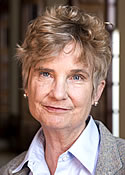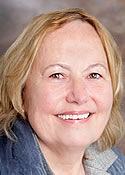Program
Friday • Saturday • Sunday • Monday • Tuesday • Back to Full Program
Society for Immunotherapy of Cancer (SITC) Symposium
Immune Biomarkers in Cancer
Sunday, May 10, 8:00 AM – 10:00 AM, Room 206-207
Chairs:
Lisa H. Butterfield, University of Pittsburgh
Augusto C. Ochoa, Louisiana State University Health Sciences Center
Lisa H. Butterfield, University of Pittsburgh, Immune biomarkers in clinical trials
Augusto C. Ochoa, Louisiana State University Health Sciences Center, Metabolism in the immune response to cancer
Giorgio Trinchieri, NCI, NIH, Omics platforms and systems biology in biomarker identification
Holden T. Maecker, Stanford University Medical Center, High dimensional cellular and proteomic profiling approaches
Major Symposium C: Looking Within: Mechanisms of Cytosolic Immune Surveillance
Sunday, May 10, 8:00 AM – 11:30 AM, Great Hall A
Chairs:Russell E. Vance, HHMI, University of California, Berkeley
Zhijian 'James' Chen, HHMI, University of Texas Southwestern Medical Center
Russell E. Vance, HHMI, University of California, Berkeley, Mechanisms and consequences of inflammasome activation
Michaela U. Gack, Harvard Medical School, RIG-I-like receptor regulation in virus infection and immunity
Edward A. Miao, University of North Carolina at Chapel Hill, Inflammasomes in host defense
Sunny Shin, University of Pennsylvania Perelman School of Medicine, Overcoming pathogen-encoded virulence activities to initiate innate immune defense
Zhijian 'James' Chen, HHMI, University of Texas Southwestern Medical Center, Innate immune sensing and signaling of cytosolic DNA
Thomas F. Gajewski, University of Chicago, Innate immune sensing of tumors via the host STING pathway
Major Symposium D: Lymphatics and Stroma: Key Players in the Specialized Lymphoid Organ Niche
Sunday, May 10, 8:00 AM – 11:30 AM, Great Hall B
Chairs:Gwendalyn J. Randolph, Washington University School of Medicine
Shannon J. Turley, Genentech
Gwendalyn J. Randolph, Washington University School of Medicine, Lymphatics in inflammatory disease
Laura Santambrogio, Albert Einstein College of Medicine, Lymph formation, circulation, and immunological role
Reinhold Förster, Hannover Medical School, Lymph node homing of immune cells via afferent lymphatics
Troy D. Randall, University of Alabama at Birmingham, Paradoxical role of the omentum in immunity to peritoneal tumors
Shannon J. Turley, Genentech, Regulation of leukocyte function and territoriality by fibroblastic reticular cells
Biju Parekkadan, Harvard Medical School, Lymph node cell therapy
How to Convert Your CV into a Resumé
Sunday, May 10, 9:00 AM – 10:00 AM, Room 210
Speaker:Derek Haseltine, Director, Career Services, College of Professional Studies, George Washington University
For anyone seeking a job outside of academe, how you present yourself on paper is critical. A well prepared resumé can make all the difference in securing that interview. The focus of this session will be on the important elements of a resumé, the differences between a resumé and the standard academic curriculum vitae, and the information needed to make a good impression. In this special career development session, attendees will be instructed in how to transform their CVs into professional resumés. Small breakout sessions for individual consulting will follow from 10:30 AM to 12:30 PM. Bring your CV!
AAI Committee on Public Affairs
Funding for Immunology Research: Non-Federal Opportunities and NIAID Program Update
Sunday, May 10, 10:15 AM – 12:15 PM, Room 210
Clifford V. Harding, Case Western Reserve University; AAI Committee on Public Affairs Chair
William Chambers, National Vice President, Extramural Research, American Cancer Society, The role of charitable and patient advocacy organizations in funding biomedical research
Gwen Nguyen, Cause Director, Indiegogo, How crowdfunding can support biomedical research
Bruce Walker, Director, Ragon Institute of MGH, MIT and Harvard; Professor, Harvard University; and Investigator, Howard Hughes Medical Institute, The role of philanthropy in supporting biomedical research
Daniel Rotrosen, Director, Division of Allergy, Immunology and Transplantation, National Institute of Allergy and Infectious Diseases, Recent trends in NIAID-funded, investigator-initiated immunology research
NIH has long been one of the major sources of funding for immunologists and other biomedical researchers. In recent years, funding constraints have lowered NIH paylines and reduced success rates, jeopardizing the research and careers of many productive and successful scientists. This session will explore some of the alternatives to NIH funding, including patient advocacy organizations, philanthropists, and crowdfunding. In addition, the session will include an update on immunology research supported by the National Institute of Allergy and Infectious Diseases. Attendees will have ample opportunity to ask questions.
International Complement Society (ICS) Symposium
Key Roles of Complement in Adaptive Immunity, Pathogen Responses, and Human Disease
Sunday, May 10, 10:15 AM – 12:15 PM, Room R06
Andrea J. Tenner, University of California, Irvine
Joshua M. Thurman, University of Colorado School of Medicine
Claudia Kemper, King's College London, Regulation of T lymphocyte programming by autocrine complement
Brian Geisbrecht, Kansas State University, Utilization of complement evasion strategies by pathogens
Susan Lea, University of Oxford, Illuminating mechanisms of complement-pathogen interactions from structural biology
V. Michael Holers, University of Colorado School of Medicine, Targeting complement and its activation mechanisms: successful interventions in human disease and new strategies going forward
Society of Mucosal Immunology (SMI) Symposium
Unique Lymphocyte Populations at Mucosal Surfaces
Sunday, May 10, 10:15 AM – 12:15 PM, Room 206-207
Timothy L. Denning, Georgia State University
Marielle C. Gold, Oregon Health & Science University
Ivaylo I. Ivanov, Columbia University, Control of mucosal Th17 cell homeostasis
Florence Lambolez, La Jolla Institute for Allergy and Immunology, DN TCRαβ+ IEL: mix and match MHC reactivities
Richard S. Blumberg, Harvard Medical School, NKT cells orchestrate critical barrier protective functions in mucosal tissues
Marielle C. Gold, Oregon Health & Science University, Human pathogen-reactive MAIT cells
The Obesity Society (TOS) Symposium
Immunometabolism of Aging
Sunday, May 10, 10:15 AM – 12:15 PM, Room 208-209
Barbara S. Nikolajczyk, Boston University School of Medicine
Gerald V. Denis, Boston University School of Medicine
Derek M. Huffman, Albert Einstein College of Medicine, Obesity, aging, and the intestinal stem cell niche
Daniela Frasca, University of Miami, Obesity, aging, and antibody responses
Marissa J. Schafer, Mayo Clinic, Cellular senescence: at the crossroads of aging, obesity, and exercise
Shai Shen-Orr, Technion-Israeli Institute of Technology, Cellular immune response to chronic inflammation
Martin S. Obin, Tufts University, Caloric restriction and immune function in aging humans
AAI Publications Committee
Publishing Scientific Articles: Advice and Admonition
Sunday, May 10, 12:30 PM – 2:00 PM, Room 208-209
Eugene M. Oltz, Washington University School of Medicine
Pamela J. Fink, University of Washington School of Medicine
Eugene M. Oltz, Washington University School of Medicine, Composing a masterpiece: make your data sing
Robert L. Fairchild, Cleveland Clinic, My most excellent paper was returned with serious reviewer issues: what do I do now?
Pamela J. Fink, University of Washington School of Medicine, How to stay on the right side of the ethics divide
In this session sponsored by the AAI Publications Committee, experienced editors will provide valuable insights in understanding the process of preparing a manuscript and responding to reviewers comments. Panelists will address questions such as: When writing a manuscript, what steps can an author take to enhance its impact on editors, reviewers, and, if accepted for publication, on readers? What are recommended practices for responding to reviewers' comments? How can authors enhance the presentation of data in figures? In addition, the Editor-in-Chief of The Journal of Immunology will speak on how to avoid possible ethical missteps in scientific publishing.
National Institute of Allergy and Infectious Diseases (NIAID) Workshop
Inflammation as an Immunological Determinant of HIV Transmission
Sunday, May 10, 12:30 PM – 2:30 PM, Room 206-207
Anjali Singh, NIAID, NIH
Alan Schultz, NIAID, NIH
David M. Asmuth, University of California, Davis
Michael R. Betts, University of Pennsylvania
Daniel C. Douek, NIAID, NIH
Mimi Ghosh, George Washington University
Ashley T. Haase, University of Minnesota
Jonathan A. Harton, Albany Medical Center
Eric Hunter, Emory University
Jeffrey D. Lifson, Leidos Biomedical Research, Inc.
Dan R. Littman, New York University School of Medicine
Bonnie J. Mathieson, NIH
Christopher J. Miller, University of California, Davis
Kristen A. Porter, NIAID, NIH
Barbara L. Shacklett, University of California, Davis
The objective of this panel discussion is to probe the relationship between inflammation and susceptibility to HIV infection and to identify novel avenues for HIV prevention, targeting mucosal microenvironment inflammation to limit HIV target cell availability. The panel will highlight recent findings and research gaps to address the key questions and challenges.
National Institute of Environmental Health Sciences (NIEHS) Symposium
Developmental Exposures and Their Effects on Immune System Function
Sunday, May 10, 12:30 PM – 2:30 PM, Room 210
Michael C. Humble, NIEHS, NIH
B. Paige Lawrence, University of Rochester
John B. Barnett, West Virginia University, Long-term changes in the immune system due to prenatal cadmium exposure
B. Paige Lawrence, University of Rochester, The environmental legacy of pollutants: linking developmental exposures to perturbations in antiviral immune responses
Kari C. Nadeau, Stanford University, Mechanistic approaches to epigenetics and toxicant exposures
Judith T. Zelikoff, New York University School of Medicine, Maternal inhalation of ambient particulate matter causes alterations in immune profiles and anti-tumor mechanisms in juvenile murine offspring
Society for Glycobiology (SfG) Symposium
Glycans and Immunity
Sunday, May 10, 12:30 PM – 2:30 PM, Room R06
Brian A. Cobb, Case Western Reserve University School of Medicine
James P. Paulson, Scripps Research Institute
Robert M. Anthony, Massachusetts General Hospital, Glycoregulation of immunoglobulins
Charles J. Dimitroff, Brigham and Women's Hospital, Galectin-1 binding glycans play a pleiotropic role in melanoma development
Eugene C. Butcher, Stanford School of Medicine, Carbohydrate addressins for lymphocyte homing
Paula A. Videira, NOVA Medical School, Immunomodulation of dendritic cells: cracking the role of sialic acid-containing sugars
Vijay K. Kuchroo, Brigham and Women's Hospital, Tim-3 and Galectin-9: regulators of effector and Treg cells
AAI-Steinman Award for Human Immunology Research Presentation and Lecture
Chair:
Linda A. Sherman, Scripps Research Institute, AAI President
 Mary Ellen Conley
Mary Ellen ConleyRockefeller University
Patients with defects in B cell development
AAI President Linda A. Sherman will introduce the awardee and present the award immediately prior to Dr. Conley's lecture.
The AAI-Steinman Award for Human Immunology Research recognizes an individual who has made significant contributions to the understanding of immune processes underlying human disease pathogenesis, prevention, or therapy.
Distinguished Lecture
Sunday, May 10, 6:00 PM, Great Hall A

Christine A. Biron
Brown University
Fuzzy borders in innate and adaptive immunity: experience conditions NK and CD8 T cell responses during viral infection
 HOME
HOME


 Show Full Program
Show Full Program Collapse Program
Collapse Program